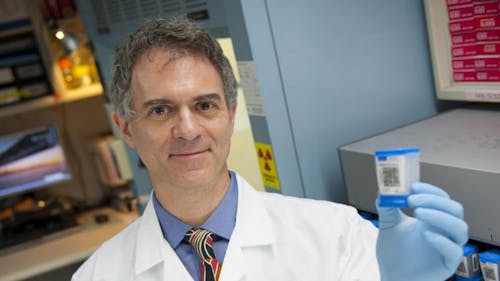Rutgers researchers develop 45-minute test for coronavirus

A team of researchers at Rutgers New Jersey Medical School (NJMS) has conducted the first external evaluation of a faster, easier coronavirus disease (COVID-19) diagnostic test, according to a recent press release.
Director of the Rutgers NJMS Public Health Research Institute Dr. David Alland and his colleagues developed the point-of-care test which, may eventually be used in physician’s offices without the need for a centralized laboratory, according to the release. The Daily Targum previously reported Alland was also named director of the new Center for COVID-19 Response and Pandemic Preparedness at Rutgers.
The new test can automatically report small amounts of SARS-CoV-2 in less than 45 minutes after the patient is swabbed at a testing site. The Targum previously reported SARS-CoV-2 is the pathogen that causes COVID-19. The test uses a single cartridge and a GeneXpert®System from a company called Cepheid. Cepheid has received Emergency Use Authorization clearance for the test by the Food and Drug Administration, according to the release.
Alland said being able to identify small amounts of genetic material from the SARS-CoV-2 virus suggests it will likely be very effective in identifying COVID-19.
“The test performed even better than our expectations, and we are encouraged about the potential for this test to help control the COVID-19 pandemic,” he said.
The test would be available the following week, according to a release from Cepheid on Saturday.
Current tests need to be sent to a lab before getting results after 1 to 5 days. Rapid testing, Alland said, will allow faster medical decisions related to triage, isolation and treatment. It will also better prepare health care professionals for future outbreaks.
“As the world will continue to need to manage COVID-19 in the coming years, the potential ability of this test to be used in doctor’s offices, clinics and even in mobile units could help to detect new small outbreaks of disease before large-scale outbreaks reoccur,” he said.
Alland said Rutgers helped expedite the research process in the interest of public health. For example, a research agreement that usually takes more than a month to negotiate was completed in three and a half days, he said.
“My team rapidly wrote out experimental and safety protocols as required for this type of work. Bio-safety and human subject reviews that usually take place sequentially were performed at the same time. Each step of the review process was completed within a day or less. A facility at University of Texas Medical Branch that had a supply of SARS-CoV-2 virus and genetic material mobilized to send to us in less than 24 hours,” he said. “Everything happened at lightning speed.”
The team is in the process of performing a clinical study to further refine its understanding of the test’s effectiveness. They have also planned additional studies to better understand the test’s role in controlling the spread of COVID-19, according to the press release.



